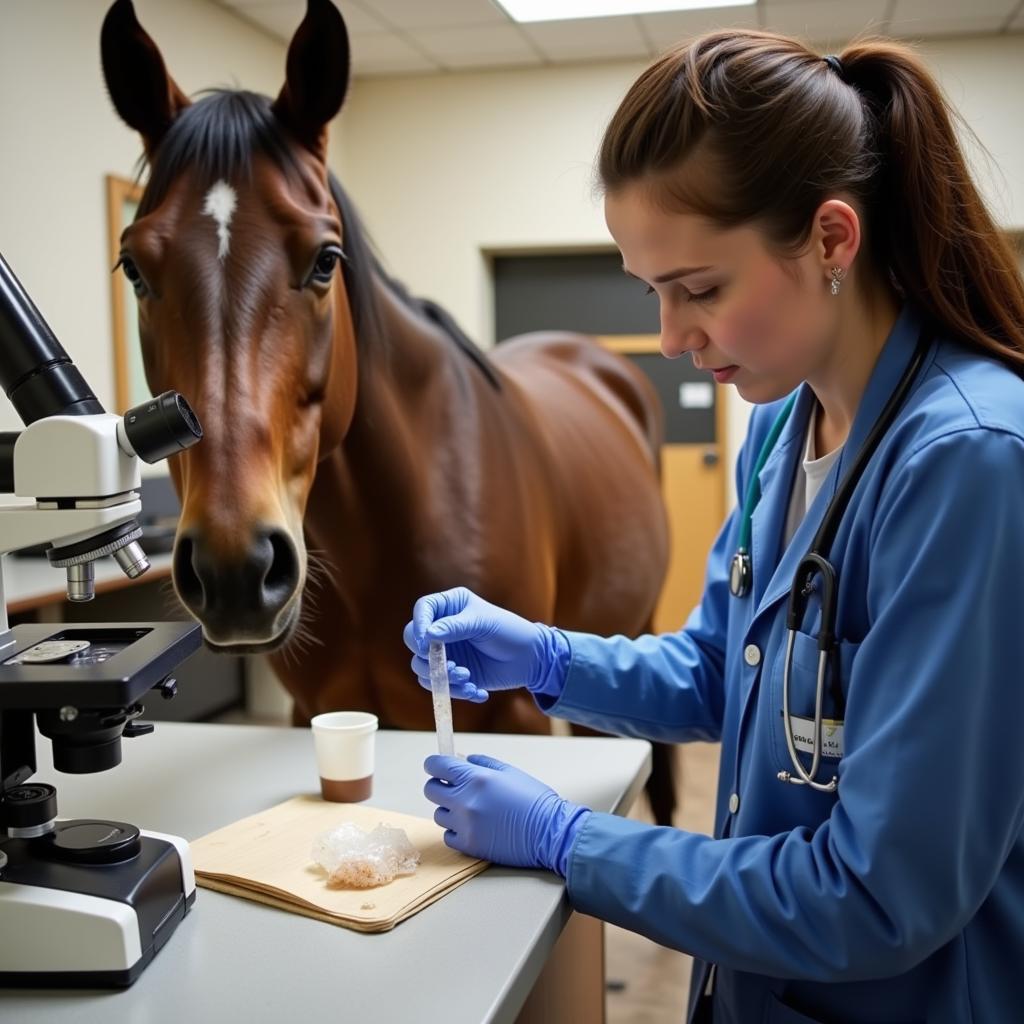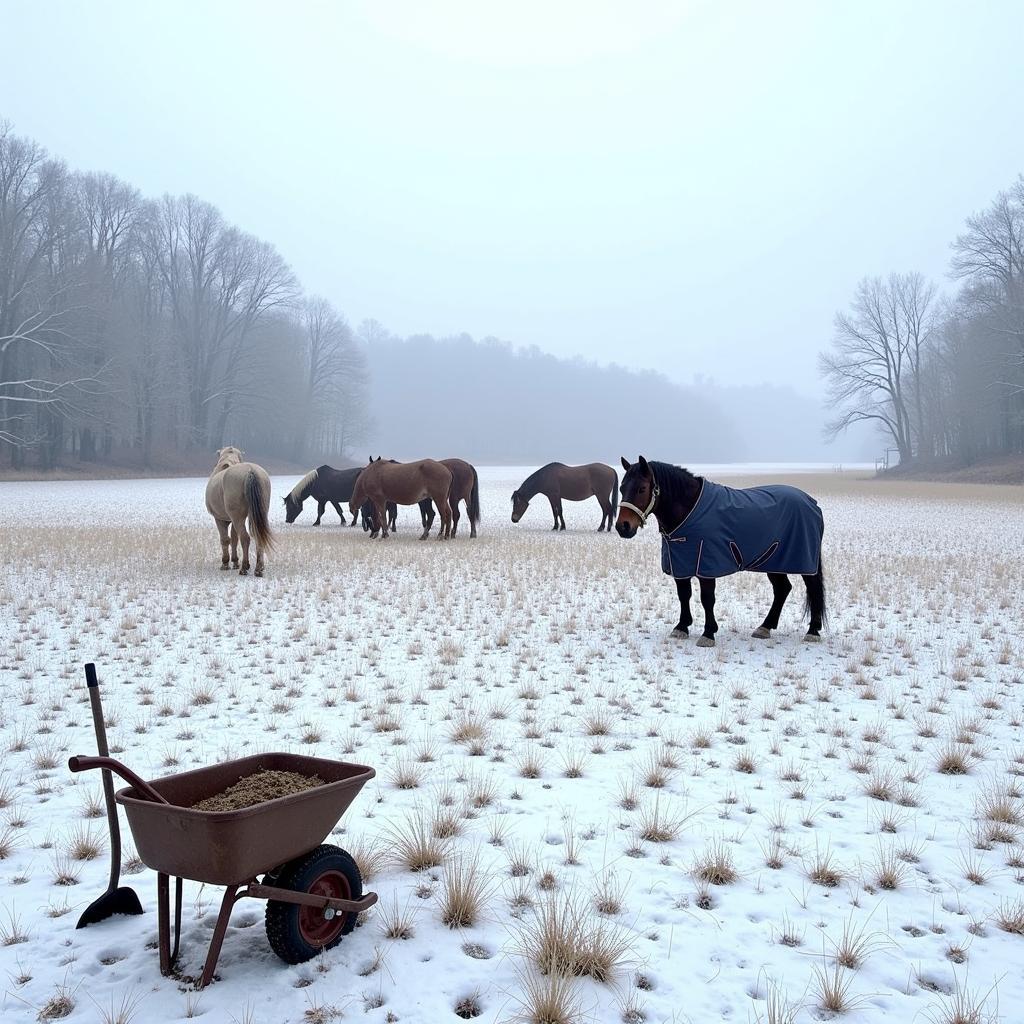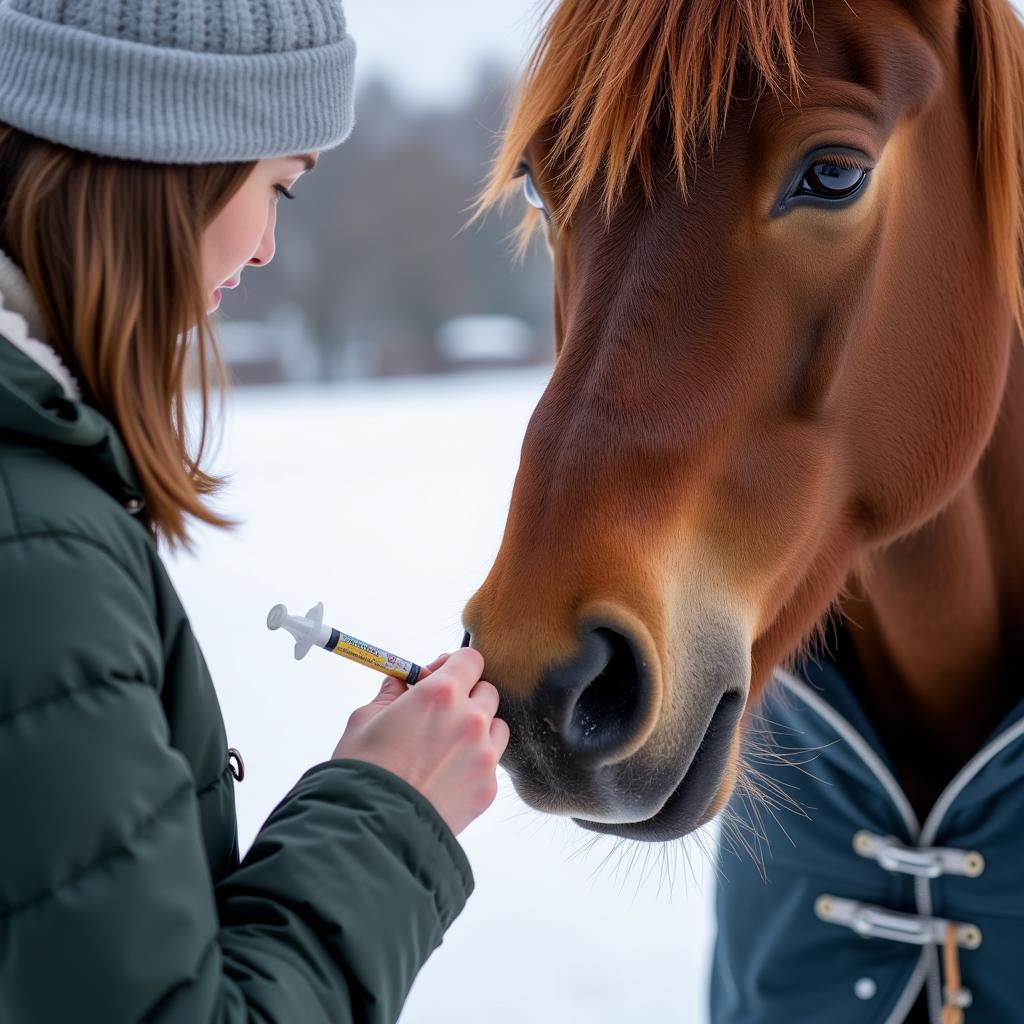Winter Worming Horses is a crucial aspect of equine health management. Parasites can thrive even in cold weather, impacting your horse’s well-being. Understanding the nuances of winter worming is essential for every horse owner. This guide will delve into the importance of a strategic deworming program during the winter months, ensuring your horses stay healthy and happy throughout the season. We’ll explore the types of worms that pose a threat, the best deworming practices, and how to tailor your approach based on your horse’s individual needs.
Why Winter Worming is Essential for Your Horse
While parasite activity might seem to decrease with dropping temperatures, many internal parasites can survive and even thrive within your horse during the winter. These resilient worms can continue to cause damage, impacting digestion, nutrient absorption, and overall health. A weakened immune system due to cold weather stress can further exacerbate the negative effects of parasites. This is why a tailored winter worming program is so crucial. Ignoring winter worming can lead to serious health issues, impacting your horse’s performance, coat condition, and overall vitality. Don’t let the cold weather fool you; parasites are a year-round concern.
If you are looking for effective solutions for your horse’s skin health, you might consider an anti itch shampoo for horses.
Understanding Common Winter Horse Parasites
Several types of worms can persist in horses during winter. Small strongyles, also known as cyathostomins, are particularly problematic. These parasites can encyst themselves in the horse’s gut wall, emerging in large numbers during warmer weather, potentially causing severe colic. Ascarids (roundworms), bots, and tapeworms are other common culprits that require attention during winter. Understanding the life cycle and potential impact of these parasites is key to developing an effective winter worming strategy.
Developing an Effective Winter Worming Program
A targeted approach is essential for effective winter worming. Rather than relying on blanket deworming treatments, fecal egg counts are invaluable in determining the specific parasite burden in your horse. This allows you to select the appropriate dewormer and avoid unnecessary treatments, which can contribute to parasite resistance. Consult with your veterinarian to develop a customized winter worming plan based on your horse’s age, health status, and pasture management practices.
Thinking about adding a new horse to your stable? Check out our horses for sale virginia beach.
 Horse fecal test for winter worming
Horse fecal test for winter worming
Tailoring Your Winter Worming Strategy
No two horses are alike, and your winter worming program should reflect this. Young horses, senior horses, and those with compromised immune systems may require more frequent deworming. Pasture management also plays a significant role. Regularly removing manure, rotating pastures, and avoiding overcrowding can help reduce parasite exposure. Consider the specific needs of your horse and adjust your deworming schedule accordingly.
The Importance of Pasture Management in Winter
Even during winter, pasture management plays a crucial role in minimizing parasite burdens. While the cold can slow down parasite development, it doesn’t eliminate them entirely. Removing manure regularly, even in frozen conditions, can help break the parasite life cycle. If you are concerned about flies during warmer months, you can find helpful information about swat for horses on our website.
 Winter pasture management for horses
Winter pasture management for horses
Debunking Common Winter Worming Myths
Many misconceptions surround winter worming. Some believe that deworming is unnecessary during cold weather, while others advocate for frequent, blanket treatments. Both approaches can be detrimental. Ignoring winter worming leaves horses vulnerable to parasitic infestations, while overuse of dewormers contributes to parasite resistance. A targeted approach, guided by fecal egg counts and veterinary advice, is the most effective way to manage parasites in your horses during the winter.
 Horse receiving dewormer in winter
Horse receiving dewormer in winter
Conclusion: Prioritizing Winter Worming for a Healthy Horse
Winter worming horses is an essential part of responsible horse ownership. By understanding the specific challenges of winter parasites and implementing a strategic deworming program, you can protect your horse’s health and well-being throughout the colder months. Remember to consult with your veterinarian to tailor a plan that meets your horse’s individual needs. Don’t underestimate the importance of winter worming; it’s an investment in your horse’s long-term health and happiness.
FAQs about Winter Worming Horses
- Do I need to worm my horse in the winter? Yes, some parasites can survive and thrive during winter.
- How often should I worm my horse in the winter? This depends on your horse’s individual needs and parasite burden. Consult your veterinarian.
- What types of worms are common in horses during winter? Small strongyles, ascarids, bots, and tapeworms can persist during winter.
- How can I test for worms in my horse? Fecal egg counts are the most effective way to determine the type and number of parasites present.
- What is the best way to prevent worms in horses? Good pasture management practices and a tailored deworming program are crucial.
- Can I use the same dewormer year-round? No, rotating dewormers can help prevent parasite resistance.
- Are there natural ways to deworm horses in winter? While some natural remedies exist, consult your veterinarian before using them.
Need further assistance? Contact us at Phone Number: 0772127271, Email: [email protected] or visit us at QGM2+WX2, Vị Trung, Vị Thuỷ, Hậu Giang, Việt Nam. We have a 24/7 customer service team. You can also find more helpful articles on our website, such as information about swat for horses.